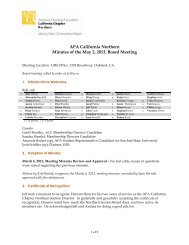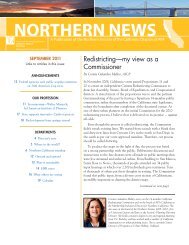Plan-it sustainably - Northern California Section
Plan-it sustainably - Northern California Section
Plan-it sustainably - Northern California Section
You also want an ePaper? Increase the reach of your titles
YUMPU automatically turns print PDFs into web optimized ePapers that Google loves.
LETTERSEd<strong>it</strong>or:How you manage to pull this off each month isamazing to me. Nice job!Michael Bills, San JoseEd<strong>it</strong>or:Thank you for the new year wishes. APA <strong>Northern</strong><strong>California</strong> is the only organization to which Ibelong or w<strong>it</strong>h which I do business that hasacknowledged Yom Kippur.Laura Saunders, AICP nCORRECTIONS – October issueOn page 7, the firm where Mott Sm<strong>it</strong>his employed as principal was incorrectlyidentified as Civic Enterprises Associates.The correct name of the firm is CivicEnterprise [singular] Associates,www.civicenterprise.com/On page 20, incorrect informationappeared about author Alice Daly, AICP.She should have been identified as“planner for Santa Cruz County,” not asredevelopment project manager/planner.http://b<strong>it</strong>.ly/R3rAq0 n2012 Legislative Year in Review for Land Use <strong>Plan</strong>ners(continued from previous page)Cottage Food Operations bill approved. Under the gut-and-amendbill AB 1616 (Gatto), c<strong>it</strong>ies and counties must perm<strong>it</strong> cottage foodoperations in residential dwellings by right. Alternatively, the agencymay grant such operations a non-discretionary or use perm<strong>it</strong>, so longas the operation complies w<strong>it</strong>h certain lim<strong>it</strong>ed restrictions such asconcentration, parking, and noise. The bill also effectively shifts theenforcement obligation of cottage food operations from local heathdepartments to local planning departments. APA <strong>California</strong> has anumber of concerns about the bill and is seeking clarificationregarding this bill’s implications for local regulation of the pointof sale of cottage food products, application of home occupationstandards, and perm<strong>it</strong> fees.CEQA only modestly reformed. In late August, SB 317 (Rubio)was introduced as a gut-and-amend bill that would have madesignificant changes to the enforcement of the <strong>California</strong> EnvironmentalQual<strong>it</strong>y Act (CEQA). While the bill was ultimately killed,this effort highlighted the deep divide between labor and othergroups seeking CEQA reform and environmental groups who areopposed to the weakening of CEQA.Several modest changes to CEQA were able to survive thelegislative process. Most notably, a handful of new exemptionswere approved, such as AB 1665 (Galgiani) for railroad crossings,AB 1486 (Lara) for roadway improvements, and AB 2245 (Smyth)for bicycle lanes.Unless otherwise provided for in the law, the statutes enactedby this new legislation take effect January 1, 2013.Alexandra M. Barnhill is a Partner in the Oaklandoffice of Burke, Williams and Sorensen, LLP.You can reach her at abarnhill@bwslaw.com n“ ‘Coming from my inexhaustible supply of dangling modifiers, you will find this post a helpful exercisein how to spot this type of error.’ That lead sentence, of course, contains a dangling modifier, a phraseproviding add<strong>it</strong>ional information about a sentence’s subject that does not associate directly w<strong>it</strong>h thesubject.” Mark Nichol tells how to spot and fix the problem: “3 Sentences w<strong>it</strong>h Dangling Modifiers,”DailyWr<strong>it</strong>ingTips, http://b<strong>it</strong>.ly/OpJSi8<strong>Northern</strong> News 15 November 2012


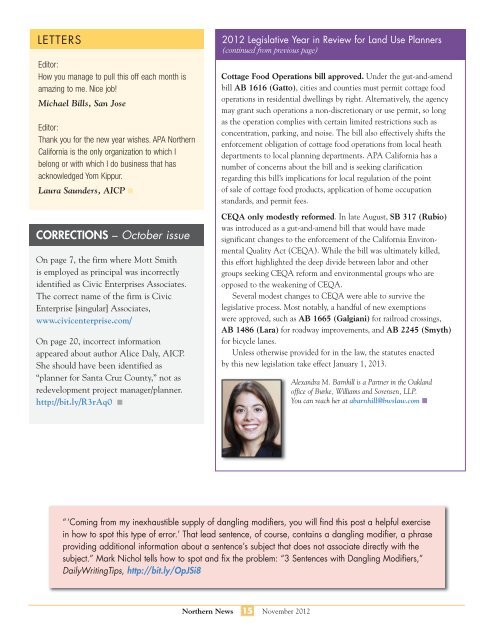
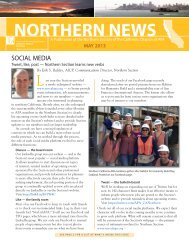
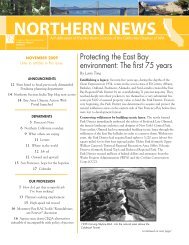
![[NAME OF EVENT] EVALUATION FORM](https://img.yumpu.com/32351925/1/190x245/name-of-event-evaluation-form.jpg?quality=85)
